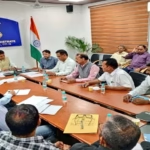New Delhi, March 20, 2025: In less than a month since assuming charge as the 26th Chief Election Commissioner (CEC) of India, Shri Gyanesh Kumar, along with Election Commissioners Dr. Sukhbir Singh Sandhu and Dr. Vivek Joshi, has set the wheels in motion for inclusive, efficient, and voter-friendly elections. The Election Commission of India (ECI) is working at every level from Booth Level Officers (BLOs) to political parties to ensure higher voter participation and a seamless voting experience.
Eliminating Duplicate Voter IDs & Strengthening Voter Lists
With nearly 100 crore registered voters, ECI is set to resolve a long-standing issue of duplicate Electoral Photo Identity Card (EPIC) numbers across the country within the next three months. Technical consultations with UIDAI will soon begin to streamline the process. The voter list updation will also be closely coordinated with birth and death registration authorities to ensure accuracy.
Addressing political parties’ concerns, the Commission clarified that any inclusion or deletion in the voter list follows a legally defined process of claims and objections under the Representation of People Act, 1950. The ECI had earlier confirmed that, following the Special Summary Revision (SSR) exercise in January 2025, only 89 first appeals and a single second appeal were filed—indicating a largely smooth revision process.
Improving Polling Station Accessibility and Voter Experience
To enhance voter convenience, the ECI is working to ensure that no polling station has more than 1,200 electors and that all polling stations are located within 2 km of voters’ residences. Even the remotest rural polling stations will be equipped with Assured Minimum Facilities (AMF), while high-rise buildings and housing colonies in urban areas will have polling stations within their premises to counter urban voter apathy.
Massive Capacity Building for Election Personnel
A two-day conference of Chief Electoral Officers (CEOs) from all States/UTs was held on March 4-5 at IIIDEM, New Delhi. For the first time, District Election Officers (DEOs) and Electoral Registration Officers (EROs) from all states and UTs also participated, helping to map out 28 key stakeholders and their roles in conducting free and fair elections.
Key decisions from the conference include:
• Harmonizing electoral handbooks and manuals with the latest legal and procedural updates.
• Developing digital training kits in multiple Indian languages for easy understanding by ground-level officers.
• Introducing animated videos and an integrated digital dashboard to modernize training.
• Specialized training modules for BLOs to be launched soon.
Strengthening Political Party Engagement
Recognizing political parties as key stakeholders, the CEC has directed all 36 CEOs, 788 DEOs, and 4,123 EROs to hold regular all-party meetings at the state and district levels. This outreach, to be completed nationwide by March 31, 2025, will resolve local electoral concerns at the grassroots level.
Additionally, the ECI has invited political parties to submit their suggestions on election-related matters by April 30, 2025. The Commission has also offered training sessions for political party representatives to ensure they fully understand the voter list revision process, claims, and objections under electoral laws. Parties have also been invited for in-person discussions with the Commission in Delhi at a mutually convenient time.
A Holistic Approach to Strengthening Democracy
With these wide-ranging reforms, the Election Commission of India is set to transform the electoral process, ensuring transparency, accessibility, and higher voter participation. By engaging voters, election personnel, and political parties, the Commission aims to make the 2025 elections more inclusive and efficient than ever before.










